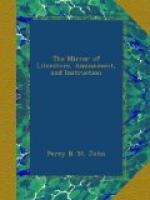But distressing as the scene was, before it closed I was sufficiently myself to recognise, with satisfaction, the majestic march of justice—the resolute, but humane administration of the law. It was sad to behold the ghastly pictures of despair then breathing, but destined so speedily to cease to breathe. Such scenes are rendered familiar to us in romance, but to gaze on the reality, and to feel that, pity as we may, no joyful denouement can be furnished to avert the contemplated sacrifice, occasions for the time excruciating sorrow. But while I felt this, and was persuaded that each of all who were with me (however idle the curiosity which brought him there) would have been glad for himself to have given them life and freedom, I admired the serene determination which still urged on the proceedings, and the sorrowful concurrence which attended them. It was the triumph of civilization, to behold every effort made to soothe calamity, without any abandonment of the forfeit justly claimed on behalf of society.
The sheriffs inquired if the unfortunates had any thing to impart, or any request to make. Answered in the negative—they added their voices to those of their religious assistants, to assure them of their hopes—that they would find that mercy in another world, which the laws and the interests of their fellow creatures denied them in this.
This language, however suited to the occasion, had been so often addressed to them, that the sufferers received it almost as a matter of course, and made little or no reply, but looking up to heaven, they at least seemed to feel that thither alone could their thoughts be advantageously directed.
They continued sitting on the bench or form to which they had been led. From time to time the sheriffs referred to their watches. The under sheriff, who had been doing the same, now exhibited his timepiece to his superior. It wanted five minutes to eight. Sir Thomas, by a slight inclination of the head, intimated that he comprehended what was intended to be conveyed.
“Had we not better move?” he inquired, addressing himself, in a tone but little above a whisper, to the ordinary.
“I think we had:” the functionary just mentioned rejoined—“the last time you know, we were rather late.”
The under sheriff waved his hand for the spectators to stand aside. His gesture was promptly attended to. The sheriffs’, holding their wands in their hands, then presented themselves as ready to march in procession. Immediately after them the minister appeared, with his open book; the culprits were next brought forward, and placed immediately behind him. The spectators, who had given way on the sides, prepared to bring up the rear, were admonished by the under sheriff not to press on the sufferers; and strange as it may seem, the intrusive curiosity of some of the party, impressed upon me a belief that this hint was not altogether unnecessary.




